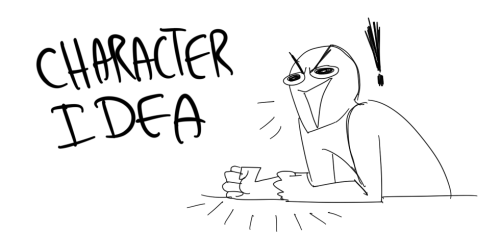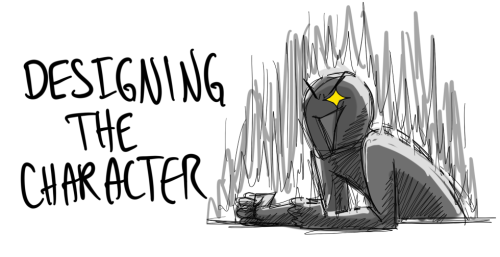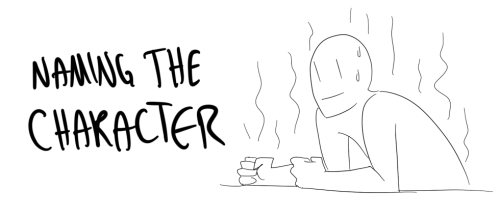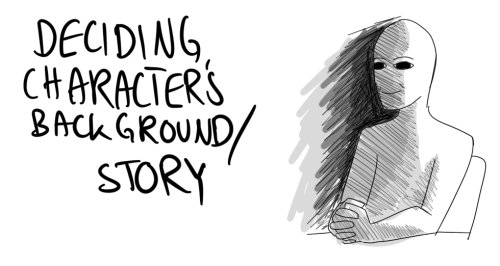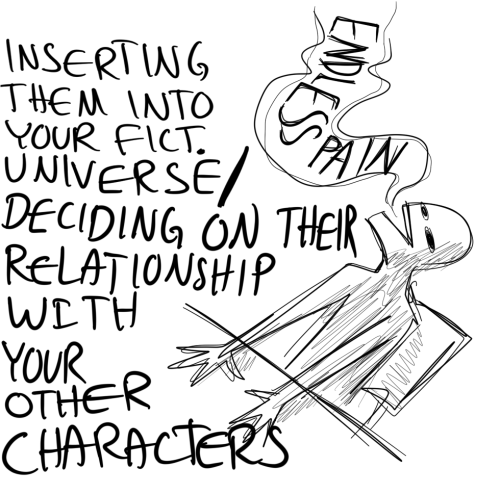Character Traits & Quirks (For Writers)
Character Traits & Quirks (For Writers)
Peace and blessings upon everyone!
I hope life's treating you well. I’m Esmeray and I welcome you to this post on my blog Dear Esmeray.
Ever wondered what makes your OC truly unforgettable? I believe it is the character traits. Character traits are what bring a character to life, or else you just have a flat, one-dimensional everyman as your OC. So today I'll be sharing with you a list of character traits that I compiled to help you develop better OCs.
Positive Traits:
Agreeable
Brave
Caring
Cheerful
Confident
Cooperative
Creative
Dedicated
Devotion
Diligent
Disciplined
Dutiful
Easygoing
Efficient
Fairness
Forgiveness
Friendly
Funny
Generous
Hard-Working
Honest
Honorable
Humble
Kind
Leadership
Love of learning
Loyal
Passionate
Persuasive
Prudent
Principled
Punctual
Reasonable
Reliable
Respectful
Responsible
Self-regulation
Social Intelligence
Supportive
Trust-worthy
Well-mannered
Witty
Wise
Neutral Traits & Quirks:
Raises Eyebrows
Blinks rapidly
Avoids eye contact
Maintains eye contact
Blinks rapidly
Slouches
Stares off into the distance
Shrugs often
Touches their scars or wounds often
Chews lips
Paces around
Smiles a lot
Rarely smiles
Gestures with hands while speaking
Often is distracted
Hums
Negative Traits:
Absentminded
Abusive
Acts superior
Alcoholic
Aggressive
Always plays the victim
Aimless
Apathetic
Arrogant
Argumentive
Avoids their problems
Bossy
Blunt
Boring
Careless
Can't take criticism
Can't take a joke
Clumsy
Conceited
Controlling
Cunning
Childish
Cruel
Deceptive
Defiant
Demanding
Disloyal
Dishonest
Dramatic
Dependent
Disorganized
Disrespectful
Distracted easy
Extravagant
Envious
Forgetful
Greedy
Holds grudges
Makes up excuses for everything
Has a reason for why nothing is ever their fault
No accountability
Hostile
Hypopocrite
Immature
Impatient
Impractical
Impressionable
Impulsive
Insensitive
Irresponsible
Not a team player
Incompetent
Irritable
Inconsiderate
Indulgent
Insecure
Jealous
Know-It-All
Lazy
Liar
Loud
Manipulative
Makes everything about them
Makes everything a joke
Their way or the highway
Mean
Meddlesome
Messy
Naive
Nosy
Obnoxious
Obbssesive
Offended easily
Overdramatic
Overreacts
Patronizing
Power-hungry
Pretentious
Rebellious
Reckless
Rude
Sarcastic
Selfish
Sensitive
Stingy
Sexist
Spoiled
Stubborn
Superstitious
Talks over others/interrupts
Too loyal
Too forgiving
Undependable
Unreliable
Unsympathetic
Unorganized
Unreasonable
Violent
Weak
Remember, there are no one-dimensional characters in real life, and there shouldn't be in your stories either. The possibilities for your characters are endless – so get creative and have fun writing!
With Love, Esmeray ♡
More Posts from Watergeus and Others
Vampire Master-Guide
First of all I want to start off by saying I've gathered inspiration from MANY vampire medias. Fictions, games. The biggest influences are Vampire the masquerade (primarily bloodlines) and Vampire Knight (manga). As well as honorable mentions to Vampyr (game), Queen of the Damned (movie) and Van Helsing (movie, anime). So if anything sounds familiar, chances are it is. I highly encourage you to explore them as they are a few of my favorites.
Second of all this is going to be massive, so I'll be putting it under a cut. But it will be a comprehensive guide to my personal vampire lore that I've crafted and worked with through the years. If you like it, feel free to use it! I'd absolutely love to be tagged (so I can shower the creations with praise) but it's not required. I'm just out here making one more version of vampires that hopefully inspires you. There will be a couple different categories that I will touch base on.
History (this part is super short)
Physicality - Medical Information
Physicality - Appearance/Body
Mental Effects
Society
Anything from my vampire lore will be tagged #vlor
Now follow me under the cut, lovelies. But please be Warned: We'll be discussing blood, violence, physical and mental illness. As well as regular vampire related things. If any of this could trigger you, please kindly skip this post because you're far more important to me!
'History'
The original vampire to walk the earth, cursed by the heavens was Caine. After committing the first murder, a blood-soaked punishment was to forever be banished to walk the darkness with a constant reminder of his crimes. Thirst. Craving for the same blood he shed against his own kin. The sin was carried through the years and he came upon another outcast kindred by the name of Lilith, cursed by God in a different way and hexed with powerful disciplines.
They bonded as kine and Lilith taught her chaos to Caine in hopes they'd rule together. In the end his nature stayed true and his now empowered wrath befalls Lilith, committing murder yet again and taking her life.
To feed upon and be fed, was a now animalistic instinct that spoke louder than supposed human nature ever could. And thus the curse spread. To anyone that drinks from the tainted or is bitten by a rabid, is surely to bear it at the final heartbeat. The path to redemption is sealed but survival is nearly infinite. So long as the beast is obeyed and satisfied, there is no constraint on lifespan. They will be damned to an eternity enslaved to thirst.
(Primarily from VTMB but I really like the idea of it being some sort of ancient curse from the gods so I thought I'd include this tiny historical bit. Onto the good stuff.)
Physicality - Medical Information
Vampires are anemic, let's just establish that all vampires are what modern day medicine would consider anemia. But they also have super aggressive red blood cells that function x100 that of human white blood cells. All in one combo of super cells. No illness spreads. No disease can contract, nothing can live in their system. They don't fall ill with colds or flu. STD's aren't feasible. Their systems are far too strong and combative to infections, bacteria.
Their integumentary systems regenerate about x200 - x300 times faster. Within seconds (if there is or has been fresh blood in the system recently) their skin regenerates and goes even beyond that. Mere hours and limbs grow back, bones realign.
Vampires don't have functioning organs. (If they are turned from humans they are there but they don't work and will eventually wither.) Hearts don't beat, lungs have no need for air.
Vampires can't drown. They don't breathe and even if water fills their lungs, they would be weighted down but not die. They also don't float like humans do naturally.
Vampires can go out in the sun but they have hard times with sun poisoning. Think of a sunburn but more like a rash. They can't process the vitamin D very well and almost all of them have trouble with getting severely burnt very rapidly or having a rash from the sun. Prolonged exposure can make them feverish, nauseated and give them body cramps and fatigue. Even longer can make them violently ill and can essentially melt their skin. It can be healed but takes longer.
Staking their hearts immobilizes them but does NOT kill them. They can be detained this way and it is excruciatingly painful. But it doesn't kill you.
Vampires can't eat food. Only few can consume liquids aside from blood. They have no ability to digest it and no longer make acid. They'll usually heave it up along with whatever blood content is left in their gut.
They have perfect eyesight, hearing, hyper senses of taste and smell. Touch is extremely sensitive as well. Their skin isn't fragile, in fact it's a bit thicker than average skin from how fast it regenerates and is constantly maintaining itself.
They are very resistant but not impossible to scar. Scars from human life are erased with first turning.
Vampire blood tastes like flat soda or icky, room temperature tap water. Unpleasant to other vampires but in a desperate pinch, it will sustain but nowhere near as good as foreign blood does. Even animal blood takes better care of a vampires system than another body of recycled blood. (Think of it as they've already taken the good stuff out of it for their own bodies so all that's left is the taste and a few stray nutrients.)
Vampires fangs grow back indefinite. At about x10 the rate of humans losing and replacing their first set. No matter what comes of them, their fangs will always grow back. No other teeth mutate like this.
Fangs lengthen and retract when around blood or not. It's not something that can be helped or even trained out. When blood is present, fangs will lengthen even if there is no intention to feed. Automatic reaction and a painful one at that. They get used to it but it's a sharp pain like having a human tooth extracted but it doesn't have prolonged swelling or discomfort. Only when getting longer or retracting back in.
Whenever they're in bloodlust or a state of starvation, they gain a sense of x-ray vision but instead it's vein mapping. They can see through skin to arteries and if it's severe blood lust, they can even see the smaller, tinier veins in fingers and faces. This is a sight that ever vampire possesses in order to obtain blood easier or figure out a good place to bite. Anything that is living will be seen in a structure of veins. Animals, humans, other vampires.
Severing the brain stem from the body is one of the few sure-fire way to kill a vampire. Alternatively burning them to pure ash and scattering them or holding them in separate vessels. (If ALL ashes are contained somehow and mixed with fresh blood, there is a reanimation process so beheading them is more permanent.) Silver weapons or exposure to silver prior to wound can result in death as well.
Alcohol is SUPER effective when they drink it. Think of one shot making them drunk because it hits their bloodstream almost immediately. A double would have them seeing double and acting like a hot mess. 3+ for even the beefiest of men would have them blacked out and vomiting on the sidewalks.
Drugs effect them but only in extremely high doses and for nothing really over 2 hours or so. Short, short longevity but they have the same crash that humans do. If it's hard detoxing symptoms for humans, it's the same but faster. They can do a hard drug, feel the high for maybe 1 - 2 hours and immediately go into hallucinating and shaking from the aftermath. The same goes for Pharmacia. There's really no medicine that works.
Garlic is a myth. So is wolfsbane.
Silver on the other hand is a very real, very deadly weapon that still rings true. A single pinprick of a silver sewing needle and it can render a vampire powerless. Slow them down to the speed of a human, take away their rapid healing and remove all of their heightened senses. Silver directly into the bloodstream essentially renders them as they were before they turned in physical response and structure. It's the only metal that burns vampires skin and will char it if it sits in one spot for too long. Silver is the only kind of metal that can forge chain that vampires cannot break and can successfully be restrained in. Any wounds inflicted in silver take longer to heal.
They can't reproduce after being turned. Purebloods + Purebloods are the only exception and it's still extremely rare. (Only 9 children born in over 2,500+ years.)
Physicality - Appearance/Body
Whatever color their eyes are, blood-lust accentuates the brightest color. I.e: Brown eyes turn Yellow/Gold, Blue eyes turn White/Purple exct. (Different powers can change this depending on the vampire and their history, sire.) Just think neon, glowing eyes in the dark if they're thirsty or hunting.
They stay frozen in whatever physical appearance they're turned in. Their metabolism is whack so they don't really lose or gain weight, it's down to cosmetic changes or cosmetic surgery. Which at least it heals flawlessly and doesn't ever change. But there aren't many options for personally invested physical change.
Their hair and nails grow super fast.
Vampires usually have the hair color they have when they are turned but around 15% experience graying or whitening of their hair within a few days of turning. Due to a semi-common genetic string in humans.
Vampires don't tan. They burn. No matter what their skin color is. Most are the palest/pasty tone of their natural skin color merely due to anemia and lack of blood circulation.
They don't blush or show physical signs of fever.
Vampires don't sweat or flush when exerting or exercising. They don't have to regulate their body temperatures.
They get dry skin pretty often and it's important to combat it with baths and soaks and lotions/oils whenever possible.
They are usually a lukewarm body temperature. As low as 15°C|59°F to as much as 21°C|69.8°F.
Every vampire has a certain amount of charming allure to them. In whatever form or fashion suits them the best, it's a natural attractant to their human counterparts. A glint to their eyes, a certain smile, the pitch or timbre of their voice. Endearing, seductive, mysterious, whichever shines through in their personality. They are magnetic, attractive to the human eye, no matter what they tend to look like.
They can see themselves in aluminum coated mirrors. Just not silver.
Mental Effects
There is a staggering 95% probability that 'created' vampires will have amnesia unless turned by a pureblood/noble/king/queen/high ranking blood vampire. They remember nothing of their human lives and this is extremely common. It's actually very rare to remember anything prior to your awakening. (That's why there are usually strict laws about siring without consent and proof of consent.)
It is very easy for vampires to be blinded by fits of rage when starving for blood. They can fly into blind anger and attack people they normally wouldn't or even foes they have no chance of winning against. Depending on their remaining strength when this tipping point of starvation happens; it can be extremely dangerous to be around.
Most turned vampires suffer a psychotic break in their early turning years. (Between 6mo and up to 25 years of awakening age. I.e: from the date of being bitten.) The brain is the last thing to be altered in the physical process and because of this, it's believed that their mental state has to crumble to be built better. It's unknown as to exactly why this happens but it's almost guaranteed. It's the vampire equivalent of 'adolescence'.
Over 75% of vampires experience periodic depression and random bouts of sadness. Another 39% live with bouts of mild to moderate psychosis. (This has been suspected to happen because of the physical stasis and improper circulation of chemicals/hormones/exct. Many believe it's because of the guilt of their King, Caine.)
Mental illnesses that aren't born from physical imbalances are in cases of amnesia, cured. Those that are chemically related are usually worsened by the stagnant physical changes of vampirism. It's rare that those with amnesia remember their traumas or emotional upsets after turning.
The "amnesia" of turning is the death of a human psyche. With the staggering rate of permanent amnesia, it is hard to figure out exactly how it happens but it's widely known.
Society
Humans are not fully aware of vampires. This still rings true with the fear of world war and or wiping out the human race given their species.
There is a high society "government" type of monarchy. Each clan or type of vampires has a leader "elder". This is usually the oldest vampire to date of that specific type. Sometimes it's a group or a family of elders. In most modern day they have adapted to a more "presidential" route and have to establish themselves as leader types to be considered for any kind of law making or enforcement. (I.e: Noble bloodline, diligent efforts of servitude such as public service, military or other.)
There is a strict law against turning humans. Vampires are required to have clearly given consent and the process is to be looked over by an elder or enforcer. They must show strenuous documentation of that persons preservation in the name of probable amnesia. They must have a comprehensive processing of that persons interests, personality traits, societal standing, proof of occupational termination, familial status and situational agreement. (Basically they don't want humans forgetting their lives entirely and they want to make sure that they are able to move somewhere or hide from their families until they're well trained enough to be around them again. It's a very long to legally accomplish it.
Every city handles turning differently. Some require the sire to pay the death penalty and others are strictly against killing the one person responsible of their turned kindred.
Vampires are in every day jobs, doing anything and everything that humans do. From trash collecting, to law and doctors. Fame, fortune, poor, criminal; they all live as many walks of life as humans do.
Anti-vampire establishments are alive and well. Most are run by other vampires. Some humans share their beliefs but most typically it's a resounding amount of vampire extremists. This is legal due to the fact that they try to adhere and coexist for their sanctions ordinance. Helping enforce justice for their regions and implore an opposing force for rampaging vampires or other law breaking kindred.
Most human killings are covered up, tampered with or has someone on the inside working on doing both. It's a constant job but a needed one to keep their existence safe from being proven.
There is a massive shortage on vampire doctors serving other vampires or studying from what little information there is on vampirism. The ratio looking like 1 to 300. 1 doctor for every 300 vampires.
The most vampire dominated and lucrative occupations are generally law, publishing and sex working. There are 3 vampires with these jobs to every human worker.
Here is an additional post about how vampire blood would effect humans.
So that was everything I could think of for the time being. I may continue to edit and update this as I have time or I think of something that I haven't touched base on yet. But this is just the general lore I work with when I do write about vampires or when I think about them in general. Feel free to skip certain parts or like.. adapt it however you'd like. I made this to more so inspire people not to show a list of HOW things should go. Take of it what you like and ignore what you don't! Add more if you think of something!
Some of it gets a bit random but it's still things that I've either incorporated in some unpublished fics or talked about with some friends or just fantasized about in general. There's bits and pieces in all media for vampires that I really enjoy and I think every new style spins something different and makes for wonderful content!
ᴡʀɪᴛɪɴɢ ʙᴏᴅʏ ʟᴀɴɢᴜᴀɢᴇ
Anger
Anger is one expression of fight-or-flight mode — an automatic, instinctive reaction to a threat. In many cases, there is an underlying fear of being harmed. Thanks to autonomic nervous system arousal, the heart rate increases, pupils dilate, and the face may flush. Other signs of anger
Balling the fists
Crossing the arms tightly
Clenching the fists once arms are crossed
Tight-lipped smile
Clenched teeth
Shaking a finger like a club
Stabbing a finger at someone
Attraction
Pupils dilate
Women will cross and uncross legs to draw attention to them
Mirroring – (usually unconsciously) mimicking the other person’s body language
Closed to Conversation
Keeping the hands in the pockets (esp. men)
Arms and legs crossed
Sitting back
Folding the hands together on a table (creates a barrier)
The “figure-four” leg cross (setting the ankle of one leg on the knee of the other) and then grabbing the lower half of the top leg with both hands.
Openness and Honesty
Exposure of the palms
Arms and legs unfolded
Leaning forward
Submissive Signals
Smiling – that’s why some people smile when they’re upset or afraid
Slumping the shoulders
Doing anything to appear smaller
Distress
Men in particular have a tendency to stroke or rub the nape of the neck when they’re upset. It acts as a self-soothing gesture to deal with a “pain in the neck.”
Crossed arms – arms act like a protective barrier
Self-hugging – arms are crossed, hands gripping upper arms
One-arm cross – one arm crosses the body to hold or touch the other arm – women keep a hand on a purse or bag strap to make this look more natural
Clutching a purse, briefcase, or bag with both arms
Adjusting cuffs or cuff-links (men’s version of the purse-strap grab)
Folding the hands together in front of the crotch (men)
Lying
Lying causes a subtle tingling in the face and neck, so the gestures below are attempts to eliminate that feeling
Covering the mouth – can be like a shh gesture, or they may cover the mouth completely – some people try to cover it by coughing
Touching or rubbing the nose or just below the nose – often a quick, small gesture, not a scratch
Rubbing the eyes (especially men)
Scratching the neck with the index finger
Superiority, Confidence, Power, Dominance
Steepling the fingers (aka setting the tips of the fingers together)
Folding the hands behind the back
Thumbs sticking out from pockets when hands are in pockets (can be front or back pockets)
Hands on hips
Straddling a chair
Hands folded behind the head while sitting up (in men)
[source]
20 secrets that your character has
1. Hidden Identity: The character is living under an assumed name and concealing their true identity for personal or safety reasons.
2. Past Trauma: The character has experienced a significant traumatic event in their past that they have kept secret, shaping their behavior and motivations.
3. Forbidden Love: The character is involved in a romantic relationship that goes against societal norms or has complications, forcing them to keep it hidden.
4. Hidden Talent: The character possesses a remarkable talent or skill that they have kept hidden from others, fearing judgment or exploitation.
5. Criminal Past: The character has a history of involvement in criminal activities, either as a former offender or as an undercover agent, which they keep concealed from their current life.
6. Family Secret: The character comes from a family with a dark or scandalous secret that they are determined to keep hidden, even if it means sacrificing their own happiness.
7. Betrayal: The character has betrayed someone close to them in the past, and they carry the guilt and shame of their actions as a closely guarded secret.
8. Hidden Agenda: The character is harboring a hidden agenda or ulterior motive, manipulating events and people to serve their own interests.
9. Hidden Wealth: The character possesses significant wealth or resources that they keep hidden to maintain a humble or low-profile existence.
10. Supernatural Abilities: The character possesses supernatural abilities, such as telekinesis or mind-reading, which they keep concealed for fear of persecution or exploitation.
11. Lost Memories: The character has gaps in their memory or a forgotten past that they are desperate to uncover, unsure of what they might discover.
12. Hidden Agenda: The character is working undercover or as a double agent, keeping their true intentions and loyalties hidden from those around them.
13. Terminal Illness: The character has been diagnosed with a serious illness but chooses to keep it a secret, not wanting to burden others or alter their relationships.
14. Stolen Identity: The character has assumed someone else's identity, perhaps due to a troubled past or to escape a dangerous situation.
15. Secret Society: The character is a member of a secretive organization or society with its own rules, rituals, and agenda, which they keep hidden from the outside world.
16. Guilty Pleasure: The character has a guilty pleasure or indulges in a secret hobby that is incongruent with their public image or perceived personality.
17. Hidden Fear: The character has a deep-rooted fear or phobia that they go to great lengths to hide from others, fearing it will make them appear weak or vulnerable.
18. Lost Love: The character had a past love or relationship that ended tragically or abruptly, and they keep their feelings and memories associated with it concealed from others.
19. Hidden Enemy: The character is secretly being targeted or pursued by an unknown enemy or antagonist, and they must keep their guard up to protect themselves and those around them.
20. Unfulfilled Dreams: The character harbors dreams and aspirations that they have never shared with anyone, feeling uncertain or afraid of pursuing them.
Follow me on my IG for more Content. https://instagram.com/saraswritingtipps?igshid=NTc4MTIwNjQ2YQ==
Body language cues for a few emotions
Happiness:
Smiling genuinely, with crinkles around the eyes.
Open body posture, with relaxed arms and shoulders.
Leaning forward slightly towards the person or object of interest.
Making eye contact with a warm and engaged expression.
Anger:
Tightened jaw and clenched fists.
Furrowed brows and narrowed eyes.
Standing or sitting with a rigid and tense posture.
Pointing fingers or aggressive gestures.
Raised voice or speaking through gritted teeth.
Sadness:
Downcast eyes and a drooping posture.
Slumped shoulders and shallow breathing.
Avoiding eye contact and withdrawing from social interaction.
Sighing or a subdued tone of voice.
Tearfulness, with watery or red eyes.
Fear:
Widened eyes with dilated pupils.
Raised eyebrows and a tense facial expression.
Frozen or rigid body posture.
Backing away or seeking physical distance from the perceived threat.
Trembling or shaking, especially in the hands or legs.
Surprise:
Raised eyebrows and widened eyes.
Mouth slightly agape or forming an "O" shape.
Leaning forward or recoiling backward in response to the surprise.
Quick inhalation or gasp of breath.
Rapid blinking or blinking more than usual.
Disgust:
Curling the upper lip or wrinkling the nose.
Narrowing the eyes and raising the upper eyelids.
Turning the head away or physically distancing oneself from the source of disgust.
Covering the mouth or nose with the hand or a tissue.
Expressing verbal disgust through phrases like "ew" or "yuck."
These are just some examples, and individuals may display variations in their body language based on their personality, cultural background, and the specific context of the situation.
some original character (OC) questions that might pique your interest and spark your creativity:
What is your character's biggest fear, and how does it affect their actions and relationships?
What is something your character is deeply passionate about, and how does it drive their goals and motivations
Describe a memorable childhood experience that shaped your character's personality or outlook on life
What are your character's quirks or eccentricities that make them stand out from others?
Does your character have any hidden talents or abilities that only a few people know about?
What is your character's preferred way of coping with stress or difficult situations?
How does your character handle failure or setbacks? Are they resilient or easily discouraged?
Describe a significant relationship in your character's life and how it has influenced them.
What is your character's moral compass? What principles or values do they hold dear?
Imagine your character in a challenging moral dilemma. How would they approach it, and what choice would they make?
Is there a specific physical feature or item that holds special significance to your character? Why is it important to them?
How does your character react to change or unexpected situations? Are they adaptable or resistant?
Does your character have any recurring dreams or nightmares? How do these dreams affect them?
What is your character's preferred method of self-expression? Do they have any artistic talents or creative outlets?
Describe a defining moment in your character's life that marked a turning point or significant change in their path.
Oh my gosh. I just found this website that walks you though creating a believable society. It breaks each facet down into individual questions and makes it so simple! It seems really helpful for worldbuilding!
Words to Use Instead Of...
Beautiful
stunning
gorgeous
breath-taking
lovely
jaw-dropping
pretty
glowing
dazzling
exquisite
angelic
radiant
ravishing
excellent
ideal
sightly
wonderful
elegant
bewitching
captivating
mesmerizing
enthralling
magnetic
impressive
tasteful
charming
desirable
enchanting
Interesting
stricking
unusual
appealing
absorbing
srresting
gripping
riveting
alluring
amusing
exceptional
fascinating
impressive
provocative
prepossessing
exotic
readable
refreshing
entrancing
exceptional
Good
honest
upright
dutiful
enthical
pure
guiltless
lily-white
reputable
righteous
tractable
obedient
incorrupt
respectable
honorable
inculpable
irreprehensible
praiseworthy
well-behaved
uncorrupted
irreproachable
Awesome
wondrous
amazing
out-of-this-world
phenomenal
remarkable
stunning
fascinating
astounding
awe-inspiring
extraordinary
impressive
incredible
mind-blowing
mind-boggling
miraculous
stupendous
Cute
endeaing
adorable
lovable
sweet
lovely
appealing
engaging
delightful
darling charming
enchanting
attractive
bonny
cutesy
adorbs
dear
twee
Shy
modest
sel-effacing
sheepish
timid
way
reserved
unassured
skittish
chary
coy
hesitant
humble
introverted
unsocial
bashful
awkward
apprehensive
If you like my blog, buy me a coffee☕ and find me on instagram! 📸
Writing Body Language
How to Improve your writing
This is something that happens every day in your life. A shift of your eyebrow in skepticism, or the way your lip may twitch to a half smile cause you’re trying not to laugh. These behaviors are vital for writing in character, because not only do the allow you to visually see what is happening but it is also reaffirming whatever emotion your character is showing.
So why should you write it?
Much of human communication is non-verbal which means you need to also translate this non-verbal reaction in a post. It allows you to greatly enhance the emotions of another character and always another person to ‘visually’ see how they feel in a post. Most of all, this will add depth and volume to your post to make it feel more real. IT will make your character feel like a human instead of just another fictional person you look at from above.
Below you will find a list different type of emotions and what sort of body language can be exhibited to them.
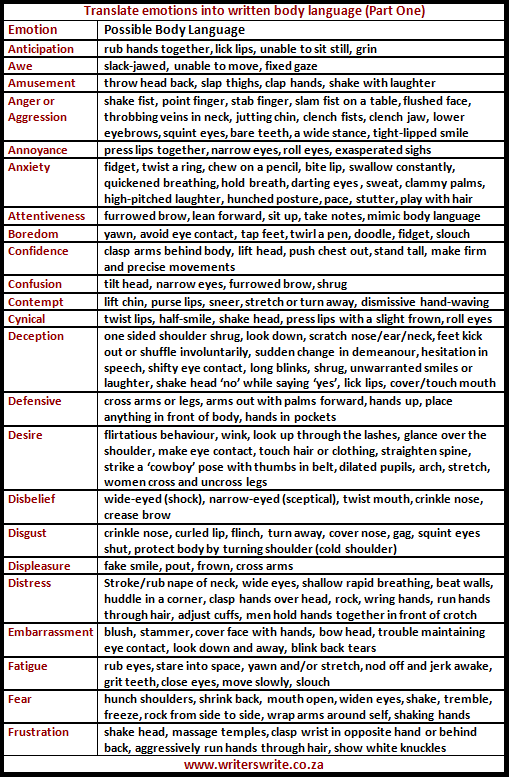
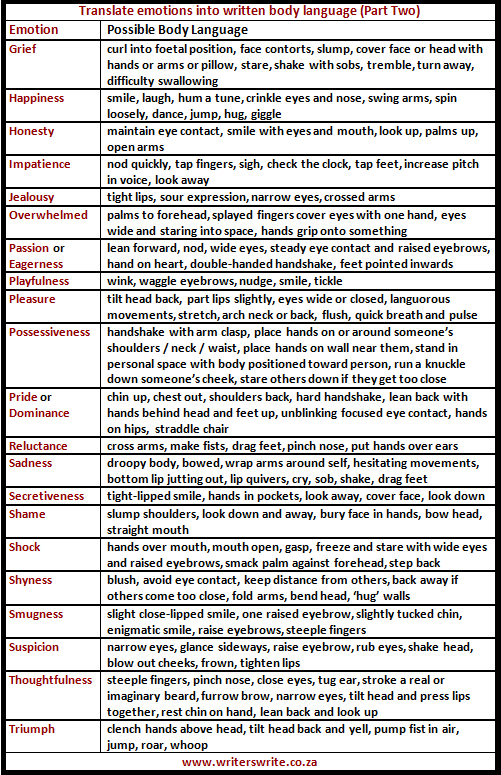
Three ways to accent an action.
When writing about emotions, there are different ways to verbally write them out. Each one is unique in their own way, allowing you to show more about the emotion.
Emphasize the Emotion. But doing this, you are expressing both the emotion and the body language. We’ll use a simple example. It’s short and simple yet you can sense he is happy. John felt so happy that he was humming a tune while walking down the hall.
Complicate the Emotion. Sometimes, even when you are feeling one emotion, deep down rooted underneath the facade of it all, there is actually an underlining emotion they feel. This is something you have to truly express otherwise no one will know. John felt so happy that he was humming a tune while walking down the hall. However, it was obvious by the way his nose crinkled that he was disgusted by the actions beforehand. Instead, John covered it up by appearing pleased today.
Contradict the Emotion. This is a little different than complicate. Contradicting means that you are claiming one thing when in fact its the other. In many ways, this has a variety of uses, from inner depth of the truth to what you see in person, or someone creating a wall. It could be considered a lie, but when is anything that easy? John felt so happy that he was humming a tune while walking down the hall. In truth, once he was in the classroom, his shoulders slumped and a pout crossed his lips when no one was around, showing just how displeased he was with the situation.
Remember that you do not always have to contradict or complicate anything. Sometimes all you need to do is emphasize and that will be just fine. You don’t always have to have an underlining complicated for an emotion to make it more enhanced.
Do be afraid to use the Thesaurus to also improve an emotion. Such things as “happy” is a nice emotional word, but think of how much more powerful it is when you heard some is “overjoyed” or “content.” She how these emotions matched up with a body language can give two different styles of happiness? Mix and match to find what works best for your character at the time.
More In Depth Information
What I’ve stated above is more of a simplistic overview. IF you truly want to improve yourself, go to this
LINK HERE
To see just how much body language can reveal about a person. You will find things such as how a person lies, how the eyes reaction, the positioning of a person in personal space, mouth, and head body language and so much more.
Use these resources to greatly increase the reactions of your character to another and create a more life-like world.
Good Traits Gone Bad
Exploring good traits gone bad in a novel can add depth and complexity to your characters. Here are a few examples of good traits that can take a negative turn:
1. Empathy turning into manipulation: A character with a strong sense of empathy may use it to manipulate others' emotions and gain an advantage.
2. Confidence becoming arrogance: Excessive confidence can lead to arrogance, where a character belittles others and dismisses their opinions.
3. Ambition turning into obsession: A character's ambition can transform into an unhealthy obsession, causing them to prioritize success at any cost, including sacrificing relationships and moral values.
4. Loyalty becoming blind devotion: Initially loyal, a character may become blindly devoted to a cause or person, disregarding their own well-being and critical thinking.
5. Courage turning into recklessness: A character's courage can morph into reckless behavior, endangering themselves and others due to an overestimation of their abilities.
6. Determination becoming stubbornness: Excessive determination can lead to stubbornness, where a character refuses to consider alternative perspectives or change their course of action, even when it's detrimental.
7. Optimism becoming naivety: Unwavering optimism can transform into naivety, causing a character to overlook dangers or be easily deceived.
8. Protectiveness turning into possessiveness: A character's protective nature can evolve into possessiveness, where they become overly controlling and jealous in relationships.
9. Altruism becoming self-neglect: A character's selflessness may lead to neglecting their own needs and well-being, to the point of self-sacrifice and burnout.
10. Honesty becoming brutal bluntness: A character's commitment to honesty can turn into brutal bluntness, hurting others with harsh and tactless remarks.
These examples demonstrate how even admirable traits can have negative consequences when taken to extremes or used improperly. By exploring the complexities of these traits, you can create compelling and multi-dimensional characters in your novel.
Happy writing!
-
 paintedonmyteeth liked this · 1 month ago
paintedonmyteeth liked this · 1 month ago -
 jyunpandorana reblogged this · 4 months ago
jyunpandorana reblogged this · 4 months ago -
 jyunpandorana liked this · 4 months ago
jyunpandorana liked this · 4 months ago -
 vibrantcoloursinmyhead liked this · 5 months ago
vibrantcoloursinmyhead liked this · 5 months ago -
 varietyoflol liked this · 5 months ago
varietyoflol liked this · 5 months ago -
 avi-mation liked this · 6 months ago
avi-mation liked this · 6 months ago -
 1-i-1 liked this · 6 months ago
1-i-1 liked this · 6 months ago -
 lunamoonartist liked this · 6 months ago
lunamoonartist liked this · 6 months ago -
 arviyya liked this · 7 months ago
arviyya liked this · 7 months ago -
 writerspup liked this · 7 months ago
writerspup liked this · 7 months ago -
 sneakysneax101 liked this · 7 months ago
sneakysneax101 liked this · 7 months ago -
 firefoxfury liked this · 7 months ago
firefoxfury liked this · 7 months ago -
 luckynesser reblogged this · 8 months ago
luckynesser reblogged this · 8 months ago -
 luckynesser liked this · 8 months ago
luckynesser liked this · 8 months ago -
 luvvixen liked this · 8 months ago
luvvixen liked this · 8 months ago -
 lalalala4422 liked this · 8 months ago
lalalala4422 liked this · 8 months ago -
 austenbaddie reblogged this · 8 months ago
austenbaddie reblogged this · 8 months ago -
 peaceloveandafropuffs reblogged this · 8 months ago
peaceloveandafropuffs reblogged this · 8 months ago -
 balladeerfatui liked this · 8 months ago
balladeerfatui liked this · 8 months ago -
 deaft-punk liked this · 8 months ago
deaft-punk liked this · 8 months ago -
 kiwidragons liked this · 8 months ago
kiwidragons liked this · 8 months ago -
 idontknowtoday liked this · 8 months ago
idontknowtoday liked this · 8 months ago -
 lunarblogz liked this · 8 months ago
lunarblogz liked this · 8 months ago -
 astarionancuntnin reblogged this · 8 months ago
astarionancuntnin reblogged this · 8 months ago -
 d4lton reblogged this · 8 months ago
d4lton reblogged this · 8 months ago -
 pandorasboxofmusings liked this · 8 months ago
pandorasboxofmusings liked this · 8 months ago -
 gunsnlilies-blog liked this · 9 months ago
gunsnlilies-blog liked this · 9 months ago -
 alienbrainworm reblogged this · 9 months ago
alienbrainworm reblogged this · 9 months ago -
 pens-wright liked this · 9 months ago
pens-wright liked this · 9 months ago -
 xxradzxx liked this · 9 months ago
xxradzxx liked this · 9 months ago -
 spore-crossed liked this · 9 months ago
spore-crossed liked this · 9 months ago -
 crookedfacecycle liked this · 9 months ago
crookedfacecycle liked this · 9 months ago -
 cloud-berry liked this · 9 months ago
cloud-berry liked this · 9 months ago -
 oogaleeboogalee reblogged this · 9 months ago
oogaleeboogalee reblogged this · 9 months ago -
 thatonekreachur liked this · 9 months ago
thatonekreachur liked this · 9 months ago -
 spoonconsumer liked this · 9 months ago
spoonconsumer liked this · 9 months ago -
 juniperize liked this · 9 months ago
juniperize liked this · 9 months ago -
 jess-e-cake reblogged this · 10 months ago
jess-e-cake reblogged this · 10 months ago -
 betrayalssting reblogged this · 10 months ago
betrayalssting reblogged this · 10 months ago -
 sadsimp reblogged this · 10 months ago
sadsimp reblogged this · 10 months ago -
 sadsimp liked this · 10 months ago
sadsimp liked this · 10 months ago -
 humongouskittentraveler liked this · 10 months ago
humongouskittentraveler liked this · 10 months ago -
 ladyfanny30 liked this · 10 months ago
ladyfanny30 liked this · 10 months ago -
 eternallydamnedjay liked this · 10 months ago
eternallydamnedjay liked this · 10 months ago -
 theindigowitch-3 liked this · 10 months ago
theindigowitch-3 liked this · 10 months ago -
 newdawnhorizon reblogged this · 10 months ago
newdawnhorizon reblogged this · 10 months ago -
 btsnowflake liked this · 10 months ago
btsnowflake liked this · 10 months ago -
 casualcheesecakee liked this · 10 months ago
casualcheesecakee liked this · 10 months ago
